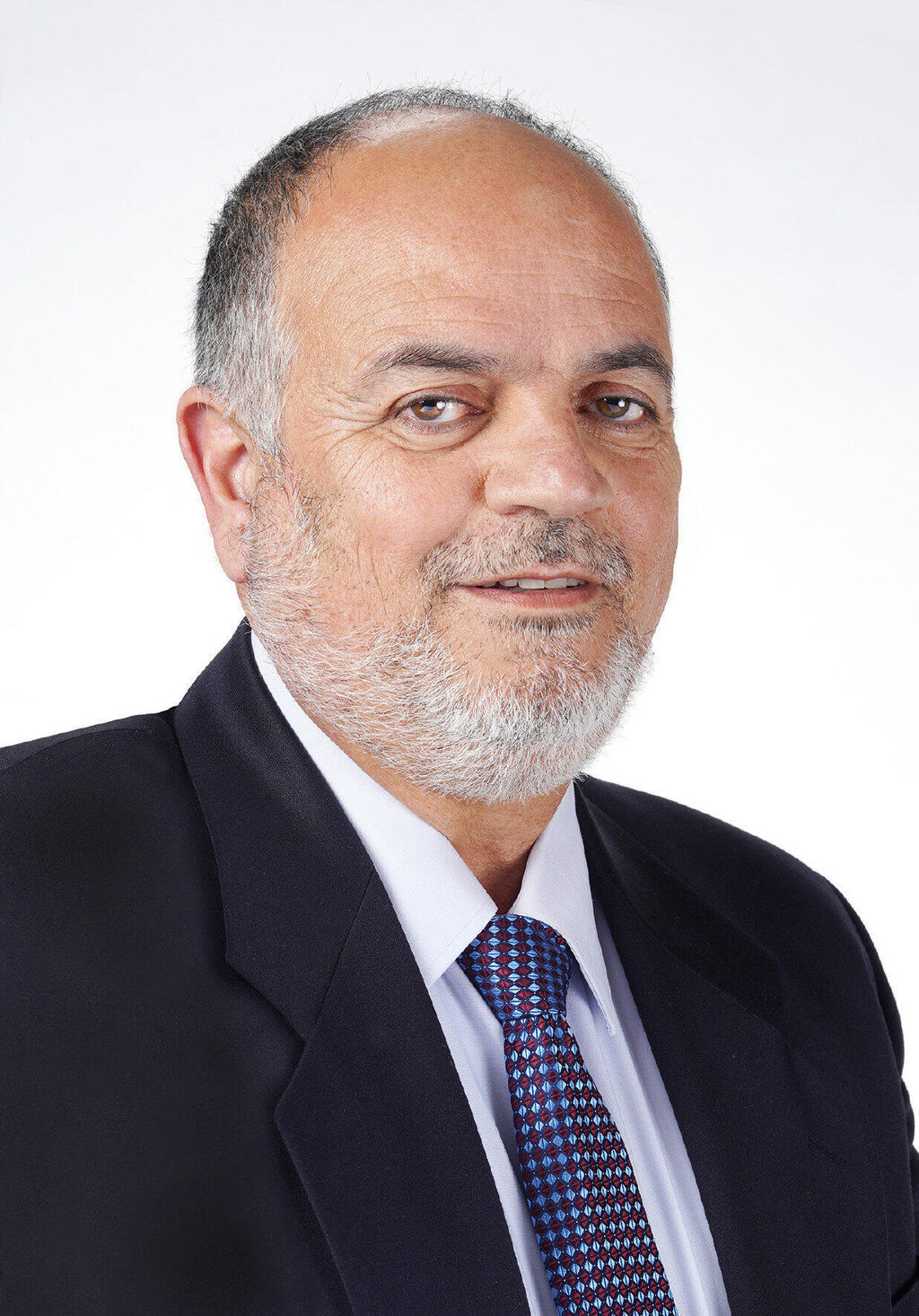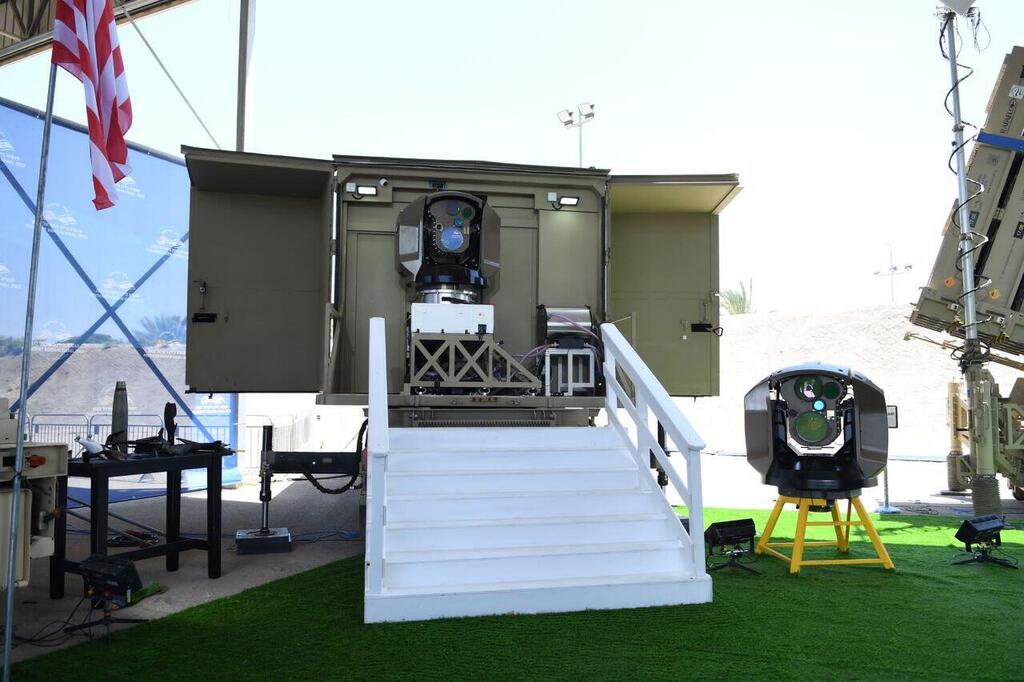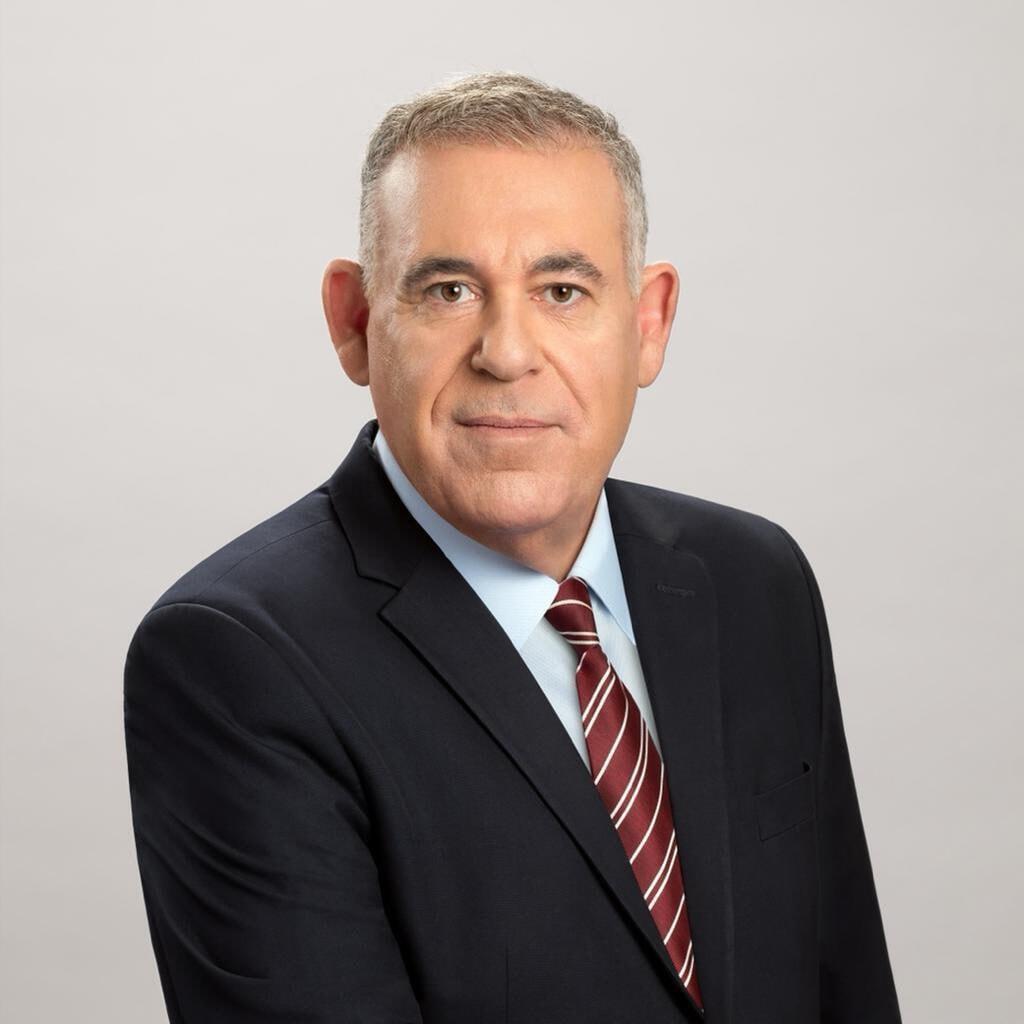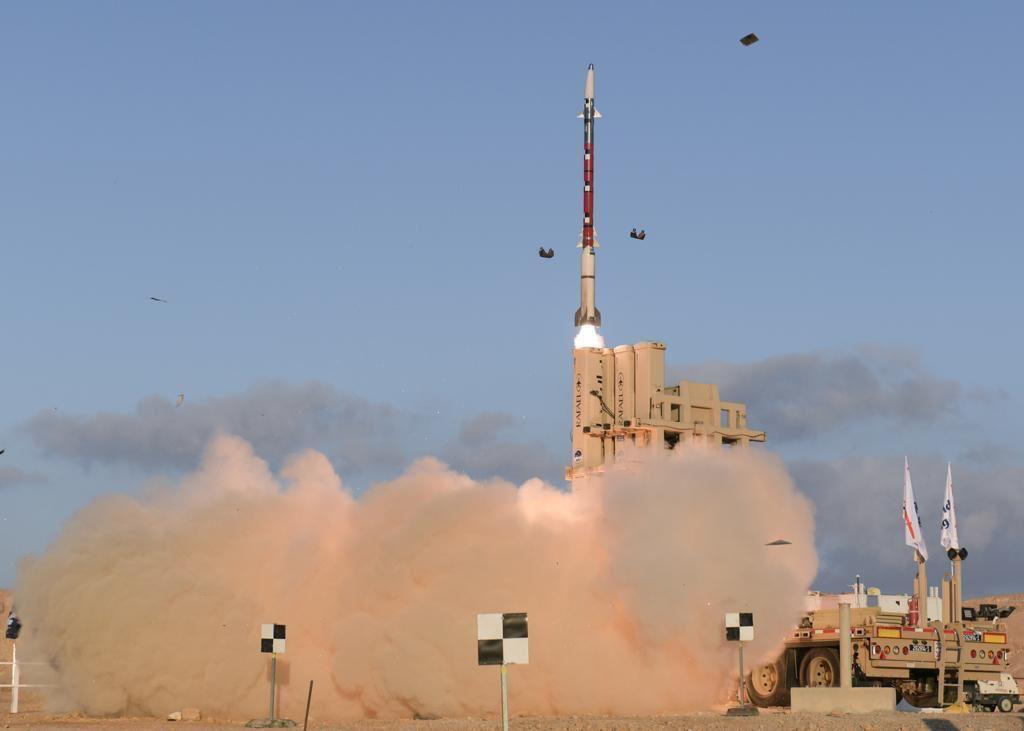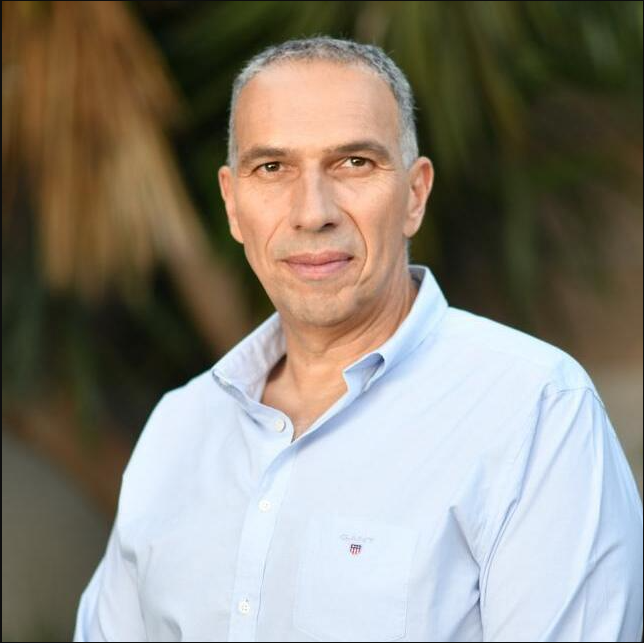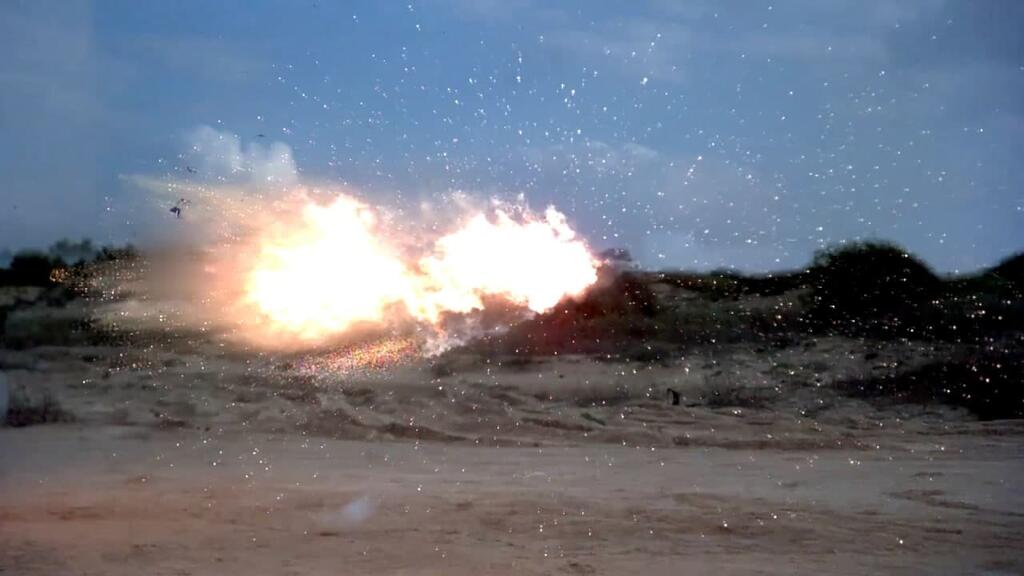Over 30,000 rockets, missiles and various other projectiles have been fired at Israel during the course of this war. That’s a lot. It could have resulted in a horrific bloodbath, even in the most developed and westernized of countries. Yes, Israel has suffered casualties, and each and every life is a universe, but the scale remains far lower than what might have been expected were it not for the country's advanced defense capabilities.
“Look at the IDF's Trophy tank defense system, then look at what happened in the Russia–Ukraine war with entire convoys burned out and destroyed. Our guys are out there in tanks in Gaza facing danger no less serious than in Ukraine,” Rafael CEO Yoav Turgeman tells Calcalist.
Although this neither sums up the 20-month multi-front nor the role Rafael has played in it, Turgeman seems pleased. Huge Defense Ministry orders are keeping Rafael’s production lines working away - particularly those manufacturing Iron Dome and David’s Sling interceptors, which have been operating around the clock since the start of the war. These have significantly boosted Rafael’s coffers, closing the gap with larger competitors such as Elbit Systems and Israel Aerospace Industries (IAI).
Even following a record sales year in 2024, Turgeman sees no slowdown in sight. Quite the opposite, in fact. He says Rafael still has more to offer. In recent months, the company has supplied the innovative Iron Beam system to the Air Force with astonishing results. Based on high-powered laser technology, Iron Beam is set to launch the IDF into a new era of energy weapons and, if all goes according to plan, could redefine the interception of rockets, drones and further aerial threats.
When will all this happen?
“We hope by the end of the year,” says Turgeman. “We’re in very advanced stages. We already have the hardware, and we’re about to announce very good news to the world, not just Israel. We’re global pioneers in laser weapons, and we’re perfecting the system to ensure it’s the best it can be.”
Turgeman says that the practical implications of the technological innovation Rafel’s engineers are presently completing ahead of the expansion of its operational use will be a significant reduction in the IDF's reliance on expensive interceptor missiles.
“We’ll be able to intercept a great many threats at the cost of electricity. We’re talking possibly two or three shekels per interception,” says Turgeman. “This has substantial military and psychological implications.”
How?
“In the past, the enemy knew that heavy rocket barrages not only caused distress for the Israeli public, but also burdened Israel’s economy. Iron Beam will slash interception costs. The ability to address threats at the speed of light means we’ll be able to neutralize threats at a much earlier stage.”
But laser-guided systems face real-world obstacles such as clouds, haze and airborne particles. I wouldn’t be so quick to dismantle the bomb shelter door.
“Many of the problems you’re talking about have been resolved. We’ll be able to operate Iron Beam even in tough weather conditions. It’ll be integrated into the Iron Dome battery network, ensuring full interception capabilities - by either missile or laser.”
Rafael's Iron Beam air defense system downs Hezbollah drones
(Video: Raanan Ben-Zur, IDF)
“Extremely advanced technology means we can focus the laser beam energy on a spot just a few millimeters wide on a fast-moving target 10 kilometers away, and destroy it. What once would have seemed like science fiction is now a reality, made possible by cutting-edge optics and algorithms. Try focusing on a spot 10 km away. You can hardly see it.”
Despite all these breakthroughs, rather unsophisticated drones have been causing us trouble over the past year.
“We intercepted them in vast numbers,” says Turgeman. “Their battlefield impact was limited. No system offers one hundred percent protection. But yes, these ‘buzzers’ in the sky do impact morale. The defense establishment has advanced significantly in detecting, identifying and intercepting these threats. Our laser system will certainly constitute a critical addition to this field.”
True, but there was nothing new about drones in this war. We’ve been seeing Iran’s activity in this field for years. Its proxies have been using them widely. Maybe we weren’t paying attention, regarding these drones as no more than ‘buzzers.’
“Developing a laser system doesn’t just take an hour, a day, a month or a year-and-a-half. Iron Beam has been in development for years. Rafael has been working for many years with the defense establishment to address these threats. In the meantime, our other systems have been handling the threats, intercepting approximately 95 percent of them. Bottom line, Israel’s aerial defense capabilities are unfathomable by any reckoning.”
What are your personal takeaways from this war?
“The constant and ongoing race to learn more. In the past, systems were hardware-based, and once development was complete, you’d carry on building the same thing for years. Now, these systems are in flux because, among other things, the enemy is learning and adapting. Our mission is to learn even faster than the enemy so as to anticipate threats and provide solutions before they arise.”
“I hope and pray that this war is nearing its end. I think we’ve been better than our enemy in learning our adversary. I’m not underestimating the enemy’s capabilities. I focus on identifying the potential future paths they may take and prepare responses in advance to ensure we maintain our edge over them."
There’s military talk of setting up a dedicated missile corps capable of quickly delivering massive, precision firepower. Where is Rafael in this?
“I believe in missile technology. A missile is a very efficient tool for achieving military objectives and the IDF is a global leader in the field.”
How do you organize a framework for these capabilities – be it an independent missile corps or missile capabilities, supported separately by air, sea and ground forces?
"This is a question the army should address. Rafael has extensive capabilities in this field and will be ready to supply the solutions the IDF needs.”
Turgeman stepped into the role of Rafael CEO in December 2023. He succeeded Maj. Gen. (res.) Yoav Har-Even, who had headed Rafael for eight years. Turgeman transferred from rival IAI, where he had served in a series of positions, most recently as CEO of radar-specialist subsidiary, Elta Systems. Turgeman’s switch raised concerns in the defense industry about the possibility of Rafael gaining access to IAI’s most covert secrets.
Do you appreciate this concern?
“Firstly, I take it as a compliment. I never thought of myself as one who knew so much.”
As CEO of an IAI subsidiary and a member of its management team, you were nonetheless privy to its most sensitive strategic plans. That’s no small thing.
“Firstly, for the most part, Elta and Rafael complement, rather than compete with, one another: Elta makes the radars used by Iron Dome. Anyone raising these concerns either doesn’t know what they’re talking about or is being deliberately misleading. Secondly, Elta and Rafael share the same owner. Conflicts of interest typically arise when people move between companies with different owners. Here, it’s more like transferring from one division to another within a bank. In our case, I work for the State of Israel. Both IAI and Rafael are state-owned, so I don’t see a conflict of interest here.”
You did sign a conflict of interest agreement?
“I signed a very detailed conflict of interest agreement for the avoidance of doubt, to set everyone’s mind at ease. Yes, I do know nearly all of IAI’s missiles and was personally involved in developing many of them but, as promised, I keep IAI secrets. You won’t suddenly see Rafael developing a radar or missile to compete with the Arrow system. I suggest we all focus on defeating our actual enemy rather than inventing imaginary ones within.”
Turgeman becomes visibly angry when asked whether he informed IAI CEO Boaz Levy that he was pursuing the Rafael job. “I don’t understand the question, and I don’t want to answer it.” He refuses to elaborate on his relationship with Levy, which has reportedly been rocky over the years and more so recently. “Everyone sees things their own way. There were times we agreed, and times we didn’t. We worked together for years. My relationship with Boaz Levy shouldn’t be of any interest to the public. As defense establishment CEOs, we have pretty decent communication, and for me, national interest must take priority above everything else,” says Turgeman.
National interests are important, but we’re all human, aren’t we?
“Yes. Look, I really love Rafael’s employees. Of the 10,000-plus workers, there are some I love more and some less, and that’s okay. The same goes for other organizations - some people I like more, some less. At the end of the day, we’re all in the same boat. Better we be bound together than fall apart alone. We’ve learned that our enemy is serious, not poetic, about it: If they could, they’d literally hang us all side by side. We can’t sideline the national interest. We need to rise above personal scores. I think the leaders of Israel’s major defense firms are doing just that, and doing it well.”
Rafael showed a 27% rise in sales last year, closing in on IAI and Elbit figures. Is becoming one of the top two defense companies in Israel a goal for you?
“No. I’m not competing with them – at least not in terms of size. Rafael was founded with a clear national security purpose, and that’s still our number one goal. We’re meeting that goal and only getting stronger. Over the past two years, our growth rate has outpaced that of both Elbit and IAI, and I believe that trend will continue. That said, I want Rafael to remain a leading, flourishing and profitable company and a source of innovation and critical capabilities. If that also makes us bigger, that’s great.”
Is there anything posing a threat to that vision?
“This growth rate is unsustainable. Companies don’t usually grow at this pace. To maintain it, you have to put in a huge amount of effort and avoid making mistakes.”
And presumably, you also need wars to keep up demand for weapons.
“Our growth rate is much higher than the global demand for weapons, meaning our market share is growing, and I want to sustain that. The global market isn’t waiting around though and there are other countries active in the field. Alliances are taking shape. It’s a very complex field and I hope we can keep navigating these troubled waters.”
Rafael employs around 10,000 people. Although Elbit’s manpower is twice that, you've now reached the same order backlog it announced a year ago. Do you think Rafael employees are more efficient?
“I wouldn’t say that, but I would say they’re more creative by far.”
With 40 subsidiaries in Israel and overseas - and more on the way
Amid Israel’s current social and political chaos, with controversies occurring at the speed of a deadly laser beam striking a distant target, then burning it away, the whole issue of the appointment of Vice Adm. (res.) Eli Sharvit as Shin Bet chief now feels like ancient history – although it was only two months ago.
Former commander of the Israeli Navy, Eli Sharvit, has been serving for the past two years as president of Rafael subsidiary DSIT, which develops systems protecting maritime infrastructure such as gas rigs and ports. The Prime Minister’s Office rescinded the appointment only a few short hours following its own announcement amid political backlash over Sharvit’s past participation in an anti-judicial reform demonstration.
Before that abrupt reversal, did Sharvit call to tell you he’d been offered the job?
“No, he didn’t. I assume he didn’t have time.”
Makes sense. Did the news come as a surprise?
“I wasn’t that surprised he was offered the job. I’ve known Eli for many years and I’ve the greatest respect for him. He was a good commander for the Navy. His capabilities were outstanding. Had he ultimately been chosen for the job, I think Israel would have had an excellent Shin Bet chief, but I’m not familiar with the decision-makers’ considerations, so I can’t really comment.”
DSIT, under Sharvit’s leadership, is one of around 40 subsidiaries Rafael operates globally. Turgeman expects that number to grow since there’s plenty of money – and that’s even after the government collects its half of the net profit as a dividend. The Government Companies Authority recently reached an agreement with Rafael's managers to withdraw a NIS 444 million ($128 million) dividend on profits from recent years. For the 2024 profits, which amounted to NIS 950 million ($275 million), Rafael is set to transfer a higher amount, NIS 475 million ($138 million), to the state, in accordance with the decision of the board of directors, pending a board decision.
Apart from dividends, which as a government company, Rafael is obligated to pay to the state, what does the company do with the money?
“It goes toward purchasing scientific equipment to enable future developments, building facilities for our engineers and scientists, and acquiring companies to improve our global market access. We intend to continue acquiring companies worldwide. This is a key part of Rafael’s business strategy.”
Are you eyeing any Israeli companies?
“Not right now, but if a good business or tech opportunity comes up, we’ll definitely pursue it. Most acquisitions don’t meet expectations. Companies might buy something in their field and then realize that the activity actually competes with their own operations. I’m glad to say that Rafael subsidiaries are thriving extraordinarily in business volume, profitability and technology.”
Rafael subsidiary Aeronautics is the subject of a Government Companies Authority report amid a series of alleged deficiencies in its acquisition during a past partnership with businessman Avihai Stolero. What did you take away from that report?
“It’s a draft report, and we’ve studied it. In fact, we corrected what needed to be corrected as we went along. Acquiring Aeronautics was a strategic move of immense value, not just for Rafael, but for the entire country. Nothing in the world compares to the systems and performance that resulted from that merger. It’s had an immense impact. There was, however, a deficiency in the acquisition process, mostly due to misunderstandings or insufficient orientation on the part of various parties, and the Companies Authority's draft report addresses this. Since then, we’ve gone through a comprehensive process with the company’s board and the Companies Authority to set up a mechanism to ensure that, next time, things are clarified more definitively. That process is now almost complete. Mergers and acquisitions are vital to any modern company.”
Get the Ynetnews app on your smartphone: Google Play: https://bit.ly/4eJ37pE | Apple App Store: https://bit.ly/3ZL7iNv
Rafael previously explored acquiring Plasan from Kibbutz Sasa and Israel Military Industries (IMI), which manufactures armored components for military vehicles. Negotiations with Plasan proved unsuccessful and the company recently announced plans to go public. IMI was sold from the state to Elbit Systems in 2018. “IMI was a great company, but circumstances put it in a financially unsustainable situation. The state sold it to Elbit and wouldn’t let Rafael buy it. I think if we’d gotten involved, we could’ve done an even better job than Elbit,” says Turgeman.
Did that acquisition make a difference to the competition between Israeli defense companies?
“Elbit received a very valuable asset and got into sectors in which it hadn’t been previously active. I’m not criticizing the decision. I certainly understand the state selling Elbit to IMI. That said, Elbit expanded into fields such as missiles, shells and rockets where it hadn’t previously operated.”
Like defense systems for tanks and further armored vehicles, such as the Iron Fist, now competing with Rafael’s flagship Trophy system.
“Great minds have tried developing something like the Trophy. For the past 14 years, Trophy has been the only operational system of its kind. Delivering a solution that works in real war - in a dense environment replete with disruptions - is an incredibly huge challenge. I wish them success. But a lot of what they were supposed to deliver hasn’t actually arrived. You must know that. You’re asking tough questions. I’m asking tougher ones. My son was there.”
What are you trying to say?
“I’d rather not go into it.”
What’s your take on competition within the defense sector?
“Competition is very healthy. Even if I didn’t have this competition, I’d create it internally. Competition sharpens thinking, improves responsiveness and pushes people to work more effectively.”
Competition seems to mostly benefit the Defense Ministry, helping it bring down prices
“For sure. The Defense Ministry wants lower costs and better solutions from the companies.”
There used to be talk of merging Rafael and IAI. They’re both state-owned and work in similar fields, so why compete when they could join forces against publicly traded Elbit?
“Both IAI and Rafael are excellent companies but, for the most part, they focus on different things. Yes, there’s some overlap – with Elbit too. However, competition sharpens the senses and ensures better availability of solutions. I think there’s a real dilemma here, and it’s worth discussing. Such a move, nevertheless, hasn’t seemed worthwhile. Over time, it was decided not to merge the companies, and for good reason. I expect this will remain the position of those committed to the matter in the future.”
The unprecedented pressure on Rafael’s weapons production facilities - mostly situated in the north of the country and frequently targeted by Hezbollah - was only one difficulty the company faced during the war: Approximately 20% of Rafael’s workforce was called up at the start of the war, and served extended reserve duty stints; several countries imposed embargoes amid on key Israeli defense companies amid Israeli actions in Gaza and refused to supply raw materials and components needed for production.
“We saw it in various ways: Some suppliers told us flat out they wouldn’t deliver components. We also had cases where I would place an equipment order, and when the delivery date came around, nothing happened. Nothing showed up,” says Turgeman.
A commander on the ground doesn’t care about these explanations. He’s in the middle of a war and he needs weapons.
“We worked it out. Rafael was less affected on this front: Operating in a global market, we’re used to finding substitutes and alternatives. For commercial reasons, too, we’re constantly sourcing new suppliers. This has helped us find ad hoc solutions and last year, in wartime, we ended up producing 60% more. The defense establishment also pushed hard for independent local production, and we’re a major part of that so as to ensure state self-reliance. Rafael is a vertically integrated company, meaning we produce many of our own raw materials. This has made things easier for us.”
Can that really hold up in the long term?
“It’s working for now. Time will be the true test. Globalization has been the main reason for lots of things not being produced in Israel: the idea that each country should concentrate on what it does best at and buy the rest from overseas. But globalization has slowed down and gone into reverse. I believe Israel will be left with no choice but to ensure it can be self-reliant in most cases.”
Israel can’t produce all the weapons it needs. Where do you draw the line?
“It’s less about drawing a line than about good judgment. At the end of the day, resources are limited, and you have to ensure they’re going to the right places. There’s strong coordination between industry and the defense establishment regarding what to invest in, how, and where. I think that’s done well.”
Can you name a Rafael system whose operational capabilities were lacking on the ground during this war?
“I can’t talk about that. We’re constantly developing systems designed to be operationally ready within a year or two or three. The war has meant accelerating our development schedules and deploying systems operationally ahead of time, boosting the IDF’s capabilities in various arenas. These systems were supposed to be delivered much later.”
How do you speed up complex development schedules, which are, for good reason, time-consuming?
“We changed our clocks. We simply worked around the clock. Bureaucracy was sidelined and processes, which would normally take months, were completed in days - all without compromising quality. We concentrated all our efforts. And it’s paid off. So many lives have been saved.”


